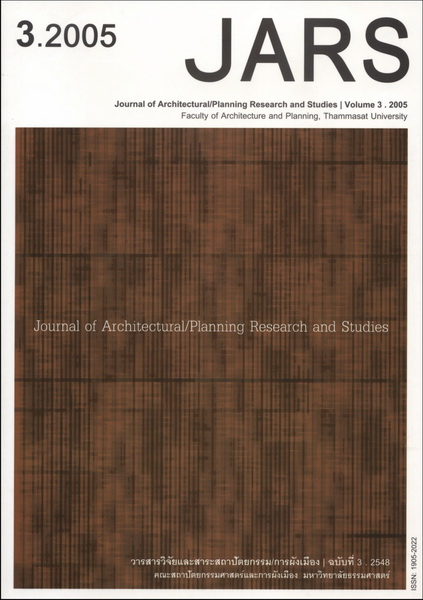Foucault’s Work for the Analysis of Gender Relations: Theoretical Reviews
Main Article Content
Abstract
Michel Foucault’s focus on power relationships has drawn political scientists, political philosophers,
and feminists to his texts. His argument which analyses power and discourse takes political analysts beyond
state as the locus of power. In general, his work is important for feminist analyses, especially the threevolume
of historical account of sexuality, because it shares with feminists and intense and critical gaze at
sexuality, ‘power and knowledge.’ However, Foucault’s politics of Western sexuality leaves female sexuality
invisible. To complete this historical account of sexuality requires feminist critiques which extend and alter
the analysis to include female sexuality. Thus, the question is not if, but how Foucault should be situated into
contemporary feminist theory. This paper examines four major criticisms that traditional feminists have
argued against Foucault’s understanding of theory-justification, power relations, collective politics, and gender
neutrality. We argue that the first three criticisms are undiscovered, but offer an important set of political tool
to feminism. For the gender neutrality criticism, we argue that Foucault’s neglect of gender difference in his
history of sexuality falls short of feminist goals. Finally, feminists should approbate only the aspects of
Foucauldian philosophy that are conductive to gender analysis and move beyond Foucault’s androcentrism to
create alternative histories of sexuality and opportunities for resistance.
Downloads
Article Details

This work is licensed under a Creative Commons Attribution-NonCommercial-NoDerivatives 4.0 International License.
All material is licensed under the terms of the Creative Commons Attribution 4.0 International (CC-BY-NC-ND 4.0) License, unless otherwise stated. As such, authors are free to share, copy, and redistribute the material in any medium or format. The authors must give appropriate credit, provide a link to the license, and indicate if changes were made. The authors may do so in any reasonable manner, but not in any way that suggests the licensor endorses you or your use. The authors may not use the material for commercial purposes. If the authors remix, transform, or build upon the material, they may not distribute the modified material, unless permission is obtained from JARS. Final, accepted versions of the paper may be posted on third party repositories, provided appropriate acknowledgement to the original source is clearly noted.
References
Danaher, G. (2000). Understanding Foucault. London: SAGE.
Fraser, N. (1989). Unruly Practices: Power, Discourse and Gender in Contemporary Social Theory. Oxford: Basil Blackwell Ltd.
Fraser, N. (1996). ‘Michel Foucault: A ‘Young Conservative’?’ in S. Hekman (ed.). Feminist Interpretation of Michel Foucault. Pennsylvania: The Pennsylvania State University Press, 15-38.
Rabinow, P. (1984). The Foucault Reader: An Introduction to Foucault’s Thought. London: Penguin Books.
Alcoff, L. (1988). ‘Cultural Feminism Versus Post-structuralism: The Identity crisis in Feminist Theory’ in Signs: Journal of Women in Culture and Society. Vol. 13, No. 31, 405-436.
Foucault, M. (1978). The History of Sexuality: Vol. 1, An Introduction. translated from the French by R. Hurley. London: Penguin Books, 94-96.
Larmour, D. H. J., Miller, P. A., and Platter, C. (1998). ‘Introduction: Situating the History of Sexuality’ in D. H. J., Larmour, P. A., Millerand, and C. Platter (eds.). Rethinking Sexuality: Foucault and Classical Antiquity. New Jersey: Princeton University Press, 3-41.
Foucault, M. (1991). Discipline and Punish: The Birth of the Prison. translated from the French by A. Sheridan. London: Penguin.
Weeks, J. (1989). Sex, Politics & Society: The Regulation of Sexuality Since 1800. (2nded.) London: Longman.
Deveaux, M. (1996). ‘Feminism and Empowerment: A Critical Reading of Foucault’ in S. Hekman (ed.) Feminist Interpretation of Michel Foucault. Pennsylvania: The Pennsylvania State University Press, 211-238.
Bordo, S. (1993). ‘Feminism, Foucault and the Politics of the Body’ in C. Ramazanoglu (ed.) Up Against Foucault: Explorations of Some Tensions between Foucault and Feminism. London: Routledge, 179-202.
Sawicki, J. (1996). ‘Feminism, Foucault, and ‘Subjects’ of Power and Freedom’ in S. Hekman (ed.) Feminist Interpretation of Michel Foucault. Pennsylvania: The Pennsylvania State University Press, 159-178.
Haber, H. F. (1996). ‘Foucault Pumped: Body Politics and the Muscled Women’ in S. Hekman (ed.) Feminist Interpretation of Michel Foucault. Pennsylvania: The Pennsylvania State University Press, 137-156.
Aladjem, T. (1996). ‘The Philosopher’s Prism: Foucault, Feminism and Critique’ in S. Hekman (ed.) Feminist Interpretation of Michel Foucault. Pennsylvania: The Pennsylvania State University Press, 283-298.
Hartsock, N. (1990). ‘Foucault on Power: A Theory for Women?’ in L. Nicholson (ed.) Feminism/ Postmodernism. London: Routledge.
McNay, L. (1992). Foucault and Feminism: Power, Gender and the Self. Cambridge: Blackwell Publishers.
Butler, J. (1996). ‘Sexual Inversion’ in S. Hekman (ed.) Feminist Interpretation of Michel Foucault. Pennsylvania: The Pennsylvania State University Press, 39-55.
Butler, J. (1999). Gender Trouble: Feminism and the Subversion of Identity. London: Routledge.
Ramazanoglu, C. and Holland, J. (1993). ‘Women’s Sexuality and Men’s Appropriation of Desire’ in C. Ramazanoglu (ed.) Up Against Foucault: Explorations of Some Tensions between Foucault and Feminism. London: Routledge, 239-264.
McCallum, E. L. (1996) ‘Technologies of Truth and the Function of Gender in Foucault’ in S. Hekman (ed.) Feminist Interpretation of Michel Foucault. Pennsylvania: The Pennsylvania State University Press, 77-98.
Bartky, S. L. (1990). Femininity and Domination: Studies in the Phenomenology of Oppression. London: Routledge.
Bell, V. (1993). Interrogating Incest: Feminism, Foucault, and the Law. London: Routledge.


